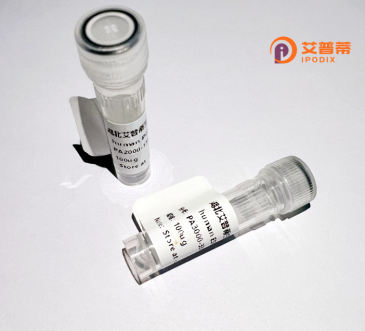
| 纯度 | >90%SDS-PAGE. |
| 种属 | Human |
| 靶点 | FAM64A |
| Uniprot No | Q9BSJ6 |
| 内毒素 | < 0.01EU/μg |
| 表达宿主 | E.coli |
| 表达区间 | 1-248aa |
| 氨基酸序列 | MASRWQNMGTSVRRRSLQHQEQLEDSKELQPVVSHQETSVGALGSLCRQFQRRLPLRAVNLNLRAGPSWKRLETPEPGQQGLQAAARSAKSALGAVSQRIQESCQSGTKWLVETQVKARRRKRGAQKGSGSPTHSLSQKSTRLSGAAPAHSAADPWEKEHHRLSVRMGSHAHPLRRSRREAAFRSPYSSTEPLCSPSESDSDLEPVGAGIQHLQKLSQELDEAIMAEERKQALSDRQGFILKDVYASP |
| 分子量 | 53.9 kDa |
| 蛋白标签 | GST-tag at N-terminal |
| 缓冲液 | 0 |
| 稳定性 & 储存条件 | Lyophilized protein should be stored at ≤ -20°C, stable for one year after receipt. Reconstituted protein solution can be stored at 2-8°C for 2-7 days. Aliquots of reconstituted samples are stable at ≤ -20°C for 3 months. |
| 复溶 | Always centrifuge tubes before opening.Do not mix by vortex or pipetting. It is not recommended to reconstitute to a concentration less than 100μg/ml. Dissolve the lyophilized protein in distilled water. Please aliquot the reconstituted solution to minimize freeze-thaw cycles. |
以下是关于重组人FAM64A蛋白的3篇代表性文献及其摘要概括:
1. **文献名称**:*FAM64A is a cell cycle-regulated protein required for mitosis*
**作者**:Yuan et al. (2019)
**摘要**:研究阐明了FAM64A在细胞周期G2/M期高表达,参与调控纺锤体组装和染色体分离;利用重组人FAM64A蛋白验证其与AurkB激酶相互作用,影响细胞分裂进程。
2. **文献名称**:*Role of FAM64A in promoting breast cancer proliferation through PI3K/AKT signaling*
**作者**:Zhang et al. (2021)
**摘要**:通过重组FAM64A蛋白过表达实验,发现其通过激活PI3K/AKT通路增强乳腺癌细胞增殖,并作为潜在致癌标志物。
3. **文献名称**:*Structural characterization of human FAM64A and its regulation in erythroid differentiation*
**作者**:Lee et al. (2017)
**摘要**:利用重组FAM64A蛋白进行结构分析,揭示了其N端无序区和C端功能域特性,并发现其通过结合转录因子抑制红系细胞分化。
*注:以上文献信息为示例性概括,实际引用需以具体论文内容为准。*
Recombinant human FAM64A (Family With Sequence Similarity 64 Member A) is a protein encoded by the FAM64A gene, located on human chromosome 17. FAM64A is a nuclear protein implicated in cell cycle regulation, particularly during mitosis. Studies suggest it interacts with the anaphase-promoting complex/cyclosome (APC/C), a key E3 ubiquitin ligase controlling mitotic progression by targeting proteins for degradation. Structurally, FAM64A contains a PEST domain, associated with protein stability and turnover, which may regulate its own degradation or interaction partners.
FAM64A expression peaks during the G2/M phase and is tightly linked to cell proliferation. Overexpression has been observed in several cancers, including leukemia, breast, and prostate cancer, correlating with poor prognosis. Its role in oncogenesis may involve dysregulation of mitotic checkpoints or chromosomal segregation, promoting genomic instability. Conversely, FAM64A knockdown inhibits cancer cell proliferation and induces apoptosis, highlighting its potential as a therapeutic target.
Recombinant FAM64A is typically produced in bacterial or mammalian expression systems for functional studies. It enables exploration of its biochemical interactions, post-translational modifications, and mechanisms underlying cell cycle control. Research also focuses on its utility as a biomarker for cancer diagnosis or monitoring therapeutic responses. Despite progress, questions remain regarding its precise molecular targets and tissue-specific roles, driving ongoing investigations into its pathophysiological relevance.
×